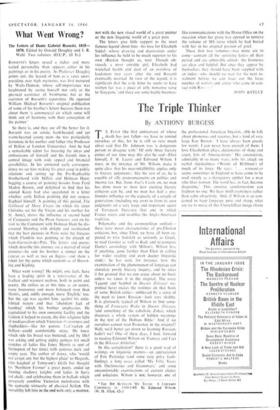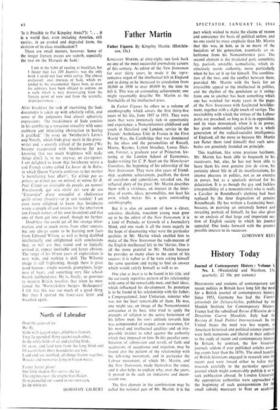The Triple Thinker
By ANTHONY BURGESS
rr S. EtioT (the first anniversary of whose death has just fallen—we have to remind ourselves of this, for he is still so very much alive) said that Dr. Johnson was 'a dangerous person to disagree with.' Of only three literary critics of our time may this also be said—Eliot himself, F. R. Leavis and Edmund Wilson. I must, in the instance of Mr. Wilson, make it quite clear that his near-infallibility applies only to literary judgments: like the rest of us, he is capable of silly pronouncements on politics and income tax. But, from Axel's Castle on, no man has done more to show how exciting literary criticism can be, and no man has had a pro- founder influence on the capacity of a couple of generations (including my own) to form its own judgments on a very large and important sector of European literature—that one in which France meets and modifies the Anglo-American tradition.
Polymathy and the cosmopolitan outlook— these were never characteristics of pre-Eliotian criticism, but, since Eliot, we have all been ex- pected. to take Sanskrit as seriously as Greek, to read Gamier as well as Kyd, and to compare Dante's cosmology with Milton's. Wilson has, if anything, gone further than Eliot in calling for wider reading and even deeper linguistic study: he has seen, for instance, how the examination of the phenomenon of language can stimulate purely literary inquiry, and he takes it for granted that we can argue about no book unless we know it in the original. The essay 'Legend and Symbol in Doctor Zhivas,,o' (re- printed here) makes the writings on that book of some British critics—unblessed by a sense of the need to know Russian—look very shabby. It is gloriously typical of Wilson to find some- thing of Finnegans Wake in Doctor Zhivago, 'and something of the cabalistic Zohar, which discovers a whole system of hidden meanings in the text of the Hebrew Bible.' And if we ourselves cannot read Pasternak in the original? Well, we'd better get down to learning Russian, hadn't we? One of these days, I look forward to reading Edmund Wilson on 'Fantasy and Fact in the Hikavat A Mullah.'
In this compilation* there is a good wad of writings on linguistic matters—an appreciation of Eric Partridge (and some very privy fault- finding), a lone essay called 'My Fifty Years with Dictionaries and Grammars,' and some uncomfortable examinations of current clichés and solecisms. Wilson is not, however, one of * THE BIT BLTWI-EN MY TEE : A LITERARY CHRONICLE OF 1950-1965. By Edmund Wilson. (W. H. Allen, 42s.) the professional American linguists, able to talk about phonemes and taxemes, but a kind of very large Ivor Brown : 'I have always been greedy for words. I can never have enough of them. I love Elizabethan plays, dictionaries of slang and argot, lists of Americanisms.' His amateurism, admirable in so many ways, robs his attack on verbal slipshodness (`Words of Ill-Omen') of much of its force. He says: `. . womanizer seems sometimes in England to have come to be used simply as a derogatory epithet for a man who likes women. The word has, in fact, become disgusting.' This emotive condemnation can frighten no one. We hear shrill crankiness rather than calm objectivity. And, if Wilson is so con- cerned to keep language pure and sharp, what are we to make of this Churchillian image (from
'Is it Possible to Pat Kingsley Amisr): . . it is a world that, even imitating America, still carries, in an eroded and degraded form, the skeleton of its class stratification'?
These are small matters, however. Some of the longer literary essays are superb, especially the two on the Marquis de Sade: I am in the habit of reading at breakfast, but I found that Les 120 lournees was the only book I could not face while eating. The almost exclusively anal interests of Sade, which ex- tended to the excremental, figure here, as even his admirers have been obliged to confess, on a scale which is very discouraging from the literary point of view and from the scientific, disproportionate . . .
After breakfast the task of examining the Sade documents is taken up with scholarly relish, and some of the judgments find almost aphoristic expression: The freakishness of Sade consists in his combining a voracious sexuality with some stubborn and infuriating obstruction to having it gratified.' The essay on 'Swinburne's Letters and Novels, which finds great merit in the prose- writer and s severely critical of the poems ('We become exasperated with Swinburne for not knowing that too much brightness will make things dim'), is, to me anyway, an eye-opener. I am delighted to know that Swinburne wrote a cod French drama called La Soeur de la Reine, in which Queen Victoria confesses to her mother 'a humiliating love affair': `Ce n'etait pas un prince; ce n'etait pas an milord, ni meme Sir R. Peel. C'etait un miserable du pea pie. an nomme Wordsworth, qui m'a recite des vers de son "Excursion" d'une sensualite si chaleureuse qu'ils ?Wont ebranlee—et je suis tombee.' I am even more delighted to know that Swinburne wrote a couple of cod reviews for the SPECTATOR (on French writers of his own invention) and that one of them got into proof, though no further.
Doubtless one could get all this strange infor- mation, and so much more, from other sources, but one always seems to be learning new facts from Edmund Wilson, as well as being drubbed intellectually and enlightened with conclusions that, so welt are they stated and so logically arrived at, appear inevitable and hence obvious. The range of his fifteen years of explorations is very wide, and nothing is dull. The Wilsonic image is still frightening, though there is great good humou: • simple warmth, grumpiness, large- ness of heart, and something very like school- boyish ludibundance. He is, finally, so generous to modern British novelists that when he men- tioned the 'Warwickshire burgess Shakespeare' I felt that this was too much of a good thing. But then I spotted the lower-case letter and breathed again.



































 Previous page
Previous page